|
|
|
Sort Order |
|
|
|
Items / Page
|
|
|
|
|
|
|
| Srl | Item |
| 1 |
ID:
132036
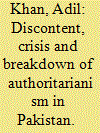

|
|
|
| 2 |
ID:
132508
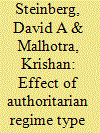

|
|
|
|
|
| Publication |
2014.
|
| Summary/Abstract |
Conventional wisdom holds that autocracies are more likely than democracies to adopt interventionist and protectionist economic policies, including fixed and undervalued exchange rates. This article suggests that this view is only partially correct: nondemocracies are a heterogeneous grouping, and only some types of authoritarian regimes adopt different foreign economic policies from those of their democratic counterparts. Using the example of exchange rate policy, the authors show that foreign economic policy varies across monarchic, military, and civilian dictatorships. More specifically, they hypothesize that monarchies and military regimes are more likely than democracies and civilian dictatorships to maintain fixed exchange rate regimes because the former regimes have smaller "selectorates" than the latter. The authors also expect that monarchies and civilian dictatorships maintain more undervalued exchange rates than democracies and military regimes because the former regimes provide their leaders with greater tenure security than the latter regimes. These hypotheses are evaluated using a time-series-cross-sectional data set of a large sample of developing countries from 1973 to 2006. The statistical results accord with these predictions. These findings indicate that the ways in which democracies engage with the global economy may be less unique than many believe.
|
|
|
|
|
|
|
|
|
|
|
|
|
|
|
|
| 3 |
ID:
134000
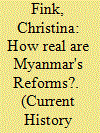

|
|
|
|
|
| Publication |
2014.
|
| Summary/Abstract |
Since 2011, Myanmar has undergone a period of extraordinary political and economic change. The government has partially democratized, reengaged with the international community, and sought to improve ordinary citizens' quality of life. Yet for all these achievements, the transition process has been uneven. The military has maintained a large degree of power and influence, and divisions persist within the government regarding the extent to which political openness and public accountability should be institutionalized. Further reforms are likely to be contentious.
|
|
|
|
|
|
|
|
|
|
|
|
|
|
|
|
| 4 |
ID:
177704
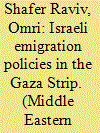

|
|
|
|
|
| Summary/Abstract |
This article uses archival sources to demonstrate how Israel crafted policies in the Gaza Strip following the 1967 War to reduce the size of its population, and how, in a two-year process, it reformed its policies to meet the needs of a long-standing occupation. Underlying these policies was the Israeli aspiration to annex the Strip without absorbing a large number of Arabs. The Israeli government developed an economic policy, based on high unemployment rates and low standard of living, aimed to encourage Gazans, and particularly refugees, to leave. In face of growing resistance, the Israeli government introduced in early 1969 a new economic policy, designed to improve the local economy, while continuing to encourage the emigration to other countries of educated youth. This new policy explains long-term demographic and economic patterns in the Palestinian society under a prolonged occupation and illuminate the Israeli mechanisms of control in the Gaza Strip.
|
|
|
|
|
|
|
|
|
|
|
|
|
|
|
|
| 5 |
ID:
165927
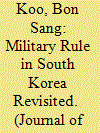

|
|
|
|
|
| Summary/Abstract |
This paper revisits the military rule in Korea by paying attention, like Korean specialists, to the disconnection in dictatorship but like comparativists, using the tools in comparative studies of modern authoritarian regimes. This paper argues that the differences in the military leaders’ orientations (personalist vs. party-based type) and survival strategies to deal with potential threat sources (key insiders, political opponents, and economic elites) entailed different regime pathways. Examining (a) how to form a ruling group in terms of unity (competing factions vs. a single dominant faction), (b) how to control the legislative branch (directly controlled organization vs. opposition parties indirectly supported by the government), and (c) how to manage capital owners (tight constraints vs. financial liberalization with occasional punishments), this paper provides an explanation as to why only the second military regime was able to open the door to democratization instead of giving way to authoritarian replacement in Korea.
|
|
|
|
|
|
|
|
|
|
|
|
|
|
|
|
| 6 |
ID:
130854
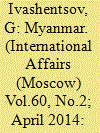

|
|
|
|
|
| Publication |
2014.
|
| Summary/Abstract |
If Asia's experience is any guide, economic success is archived only by nations with strong governments, even if they curtail some rights.
Myanmar, formerly Burma, has been increasingly in the focus of international mass media in recent years. The sudden visit paid there in 2011 by Hillary Clinton, was followed in 2012 by that of Barak Obama.
|
|
|
|
|
|
|
|
|
|
|
|
|
|
|
|
| 7 |
ID:
144755
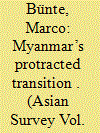

|
|
|
|
|
| Summary/Abstract |
This article argues that Myanmar is experiencing the beginning of a protracted transition, in which the military, the opposition, and the country’s civil society are renegotiating political space. The protracted transition might take decades, and opposition forces and civil society will face an uphill struggle to fully liberalize the regime.
|
|
|
|
|
|
|
|
|
|
|
|
|
|
|
|
| 8 |
ID:
128386
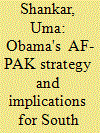

|
|
|
|
|
| Publication |
2011.
|
| Summary/Abstract |
The Af-Pal< strategy of Obama Administration marks a distinct stage in the evolution of the US policy towards Afghanistan since Septemberl 1, 2001. It draws upon the inadequacies of the Afghan policy of the Bush Administration which apparently believed in the rhetoric of war against terror but did not adopt effective strategy with well defined priorities. 'The Bush Administration's objectives were threefold: defeat of Al Qaeda, destruction of the Taliban supportbase and blind determination to bring democracy to Afghanistan and the wider Muslin world. Beyond these general aspirations, the US government during the Presidency of George Bush, never had an Afghanistan or Pakistan strategy let alone an At'-Pal: strategy'.' Pakistan's covert support to Taliban leading to its resurgence and the inability of the US forces in hunting down Al Qaeda and the Taliban were causing uneasiness in the minds of the US leaders. Yet George Bush did not take any substantial initiatives in order to match anti-terror rhetoric. He was not prepared to review the traditional 'perception of the United States towards Pakistan, whose military regime had, as a matter of convenience, suddenly turned into the US ally against terror.
|
|
|
|
|
|
|
|
|
|
|
|
|
|
|
|
| 9 |
ID:
108531
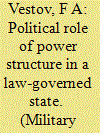

|
|
|
| 10 |
ID:
040320
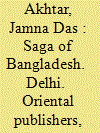

|
|
|
|
|
| Publication |
DelhI, Oriental Publishers, 1971.
|
| Description |
368p.hbk
|
|
|
|
|
|
|
|
|
|
|
|
Copies: C:1/I:0,R:0,Q:0
Circulation
| Accession# | Call# | Current Location | Status | Policy | Location |
| 007001 | 954.9204/AKH 007001 | Main | On Shelf | General | |
|
|
|
|
| 11 |
ID:
089922
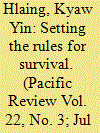

|
|
|
|
|
| Publication |
2009.
|
| Summary/Abstract |
Regardless of its growing unpopularity, the ruling military junta in Burma remains far stronger than any of its foes in the country. This article probes how the junta managed to remain in power for such a long time. The answer lies in the informal procedures that governed the way leading members of the junta dealt with their differences and disagreements with their colleagues. Deriving from the rules of engagement within the military established by former military dictator Ne Win, two features came to epitomize the organizational culture of the Tatmadaw (armed forces). The first of these is the maintenance of incriminating evidence against senior members of the military in the event that they fall out of favour or need to be disciplined. The second feature of this culture that has now taken root is the observance of discrete domains of operation. This latter feature allows for the dissipation of tension between officers who are unable to get along well with each other. Importantly, it also prevents a senior officer from acquiring sufficient power to challenge more senior officers within the Tatmadaw hierarchy. Once certain rules became established norms of the Tatmadaw, they came to influence the actions and strategies taken by military officers. The rules that governed the ways military officers interacted with the colleagues they did not get along with and the incentives the Tatmadaw as an organization has created for its members have kept it together. Therefore, regardless of external and internal pressures, the army remains the most organized institution in Burma and appears to be more unified now than ever before.
|
|
|
|
|
|
|
|
|
|
|
|
|
|
|
|
|
|
|
|
|